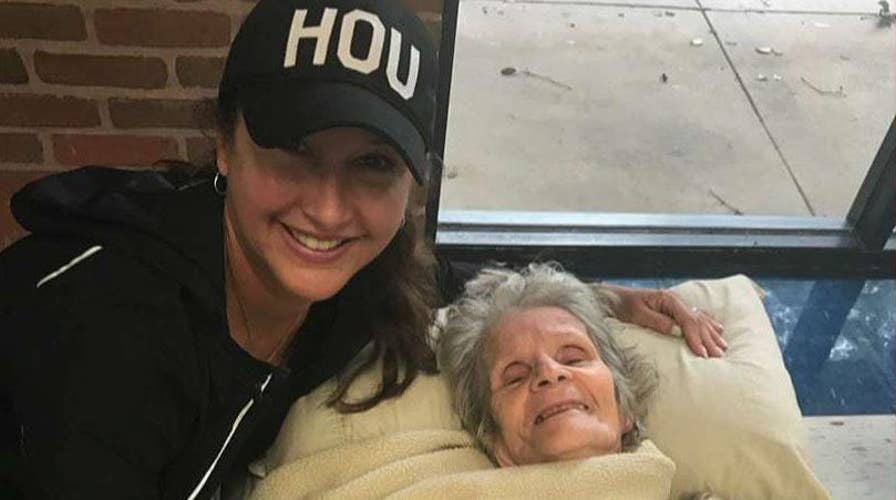Texas family jumped into action to help Harvey victims
Moran family is helping to coordinate rescues, gather supplies
Seeing the destruction and suffering caused by Hurricane Harvey on TV – as survivors take their first steps on the long road to recovery – brings back my own memories of the aftermath of 55 deadly tornadoes that claimed 243 lives in Alabama on April 27, 2011.
Some things I learned after that terrible day six years ago can help us all understand what’s to come for the more than 1 million people displaced from their homes and for others whose lives were also upended by Harvey’s fury in Texas and nearby states.
I was not in Alabama when the killer tornadoes struck. I arrived in Birmingham the next day, moving there to start a new job as host of a radio talk show.
I was terrified by the devastation I found in my new community. So many people injured. So many dead. So many homes turned to rubble. Debris piles taller than me. Roads impassable.
I submerged myself in working to help my radio audience – folks who needed healing, prayer and a listening ear. And with three postgraduate degrees in mental health, I got out of the radio studio as well, meeting more people than I can count to help them cope with their trauma.
The lessons I learned in those terrible times have stayed with me. I want to share them.
Disaster survivors are leaders in helping each other recover. In the aftermath of the Alabama tornadoes, people helped each other survive.
I spent time with a nurse who had turned her home into a temporary medical emergency room. The home was a bloody mix of debris and wounded neighbors. The nurse’s son was injured by flying glass, but she stitched up his wounded back and he was helping her treat neighbors at a time when emergency medical crews couldn’t reach the area.
I saw that scenario over and over in Alabama. And now the same thing is happening in Texas.
People opened their hearts and their wallets. The radio station where I worked set up a supply station in a parking lot near some of the worst storm devastation so we could relay needed items to those trapped in the rubble and to families trying to put their live back together.
Cars lined up for miles so people could make donations. Some came from other states. It was as if the whole world stopped to extend a helping hand and a warm heart. People wanted to give – in whole, pure, real ways – and they wanted nothing in return.
The same thing is happening in Texas, as we see millions of dollars in donations pouring in from across our country.
Recovery is slow. In Alabama it took weeks before the recovery of bodies was complete. It took months before some roads were even passable. And it took years for hearts to recover from the loss of life, memories and the security that comes with experiencing such devastation.
But here is what I remember most: Alabama came out stronger, better and united in ways you can only know if you have witnessed human compassion and need in such raw terms. The courage and character of the people pierced my soul and left me forever changed.
Texas will come out stronger and better in the months and years ahead as well.
Disasters can change lives in positive ways. As a mental health professional, I can tell you that research shows that horrors like those Alabama experienced in 2011 and Texas is experiencing now can ultimately change lives for the better. Character is built. Heroes are made. Priorities are defined. And human nature can be at its best.
Studies show that hopefulness in communities that experience tragedy is often heightened – not depleted. People find new purpose and focus. They renew their lives in ways only achievable after tragedy.
Charity benefits those who give as well as those who receive. Studies show that people who give money and supplies to disaster survivors have tangible mental and physical health advantages, according to Elizabeth Dunn, a professor of psychology at University of British Columbia who studied the mental and physical health effects of those who give.
“Money doesn’t seem to buy quite as much happiness as many people assume,” Dunn reports. She cites one study where people were given money and asked to choose to spend it on others or on themselves. Altruism won out overall, and across the board.
“People who donate money to charity are happier in poor and rich countries alike,” Dunn concluded. “You don’t have to have a lot to experience the emotional benefits of giving.”
Dunn found that people who give altruistically experience notably lower blood pressures, even when experiments were controlled for factors such as age, exercise and income. However, blood pressures did not show any change after people spent money on themselves.
A big part of my heart will always be with the good people of Alabama. Still today, years after moving away to take another job, I can go there and people still hear my voice in a restaurant and ask, “are you Dr. Gina?”
Then they proceed to tell me how one lonely night, in the rapture of the tornadoes and in the days that followed they found hope in a friendly voice on the radio. They will never forget me and, rest assured, I can never forget them.
Devastation creates heroes who may not have ever had the opportunity to be heroes otherwise. It creates victory where people couldn’t find purpose before. It can create calm in the storms of life. And it can create memories that build the centerpiece for life – that of giving, and being cared for – in some ways, perhaps, our most human experience of all.

